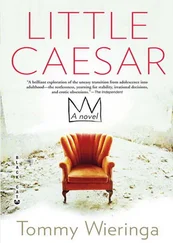Kathleen dug into her handbag and pulled out a compact. She turned her back to him and dabbed vigorously at her mouth. Across the washlands, crooked columns of dust were rising up behind the threshers.
‘Is it gone now?’
He nodded. ‘It’s gone.’
‘Why do you let people call you Joe Speedboat?’ Kathleen asked pointedly.
‘Because that’s my name.’
‘But you don’t own a speedboat, do you?’
Joe shook his head.
‘And what about your real name?’
‘There is no real name, only a mistake my parents made.’
His smile placed the conversation in another, warmer light.
‘Joe Speedboat, that’s just my name, Mrs Eilander, really.’
‘Oh, please call me Kathleen. It makes me feel so old to be called “Mrs”.’
Kathleen looked toward the waterline, where her husband and a few others were waiting for the boat’s return like believers awaiting redemption.
‘He should wear his hat,’ she said. ‘He’ll get a sunburn like this.’ She sniffed. ‘Your stepfather has been gone for an awfully long time, if you ask me. I would be worried sick if I were Regina. After all, a boat can sink, can’t it?’
Regina and India were standing down by the water as well, apart from the others. India spoke words of comfort to her mother, who was bent over with worry. Julius Eilander came up the ramp, shoes in hand, and suggested they drive down-river a ways to see if they could find Papa Africa. He asked his wife for the car keys. The things-aren’t-what-they-used-to-be men didn’t wait to see what would happen, they thanked Regina clumsily for ‘all the hospitality’ and headed off to their bench.
Julius Eilander returned half an hour later. He had driven all the way down to the New Bridge but hadn’t seen the big sail anywhere. Faith in a happy ending had faded. A mood gray as a cloud of ashes settled over those still at the landing.
‘We should call the police,’ Julius Eilander said.
‘Not that they’ll do much around here,’ his wife said.
No one dared to look at Regina, as though just looking at her would hit the percussion cap of her fear and pain and result in something you couldn’t oversee. Julius Eilander drove back to Lomark; his wife stayed behind at the old shipyard, along with a few others who were saying, ‘Have you ever seen anything like it?’ and ‘if I hadn’t seen it with my own eyes’. The flames went out under the hot trays, no one bothered to relight them, the waiting took on the character of a wake. The blue hour was rising up around us, the blackbirds sang and chased each other through the bushes. Mrs Tabak, whose house Regina cleaned, turned to leave. She said, ‘Try to stay optimistic, Regina, no matter how hard it seems.’
Two cars approached along the Lange Nek, Julius Eilander out in front and Sergeant Eus Manting’s police cruiser bringing up the rear. They parked on the landing. Manting climbed out slowly and shuffled toward the group like a worn-out circus bear. He nodded to Kathleen Eilander, whom he remembered from a complaint about obnoxious air traffic.
‘You’re Mrs Ratzinger?’ he asked Regina.
He took a notepad from his inside pocket, flipped it open and held it at bent-arm’s length.
‘The situation was explained to me by this gentleman. I’ve contacted the river police and reported missing a wooden sailboat, approximately six metres long, in the colours red and white. Is that correct?’
Regina and India nodded.
‘Good,’ Manting went on, ‘and on board is a certain Mr. .’
‘Mahfouz,’ India said promptly, ‘Mahfouz Husseini.’
‘Mr Husseini. And where is Mr Husseini from, if I may ask?’
‘He’s Egyptian.’
‘Does he speak Dutch?’
‘He understands it better than he speaks it.’
‘And did he provide any information concerning his destination, leave anything behind. .?’
Regina opened her mouth, her breathing came in fits and starts.
‘Mahfouz was just trying out his boat,’ she said. ‘That’s all. A little jaunt. Up and back, no more than that. So where is he now ?’
She poked her finger accusingly at Manting.
‘So where is he now ?’
‘My colleagues are looking for him, Mrs Ratzinger, at this point there’s nothing else we. .’
‘ Where is he now ?’
‘Now don’t get worked up, ma’am, my colleagues are combing the river for him right now.’
At those words something snapped. Regina turned and walked away, weeping for the first time that day, with the howling ups and downs of a chainsaw. With her eyes, Kathleen Eilander heaped flaming reproach on Sergeant Manting for his lack of tact and went after her. Manting climbed into the cruiser and backed away from the landing. As he made the turn, his headlights swept over a shape down at the waterfront. Joe.
That was how the day ended, with Regina choking on her tears as she leaned against the Bethlehem Asphalt amphibian and Joe coming up the boat ramp and stopping beside the table that still held enough food to sate Tamerlane’s hordes. He stuck a soggy rooster-biscuit in his mouth.
‘Donkey knows the way,’ he said quietly. ‘Donkey knows the way.’
October came and Papa Africa still hadn’t returned. In Regina Ratzinger’s eyes there smouldered a plaint against a world in which people lose the thing they love most. She became a woman people looked past in order not to have to see that.
Her first husband had a grave she could visit, the second hadn’t even left behind a body to which she could say goodbye. Once the sun had risen from the morning mist and was climbing quickly in pale and brighter light, Regina would walk along the Lange Nek to the river. There where the ship was launched she stood like the statue of the sailor’s wife looking out to sea. She lived with one foot in hope and the other in sorrow, without being able to give in fully to either of them. The sound of the telephone ringing was never the same to her again.
When you saw her standing there, your heart shrivelled like an old apple. You prayed with her that the drab dragon’s wing would come sailing around the bend any moment. That Papa Africa would moor his boat and say, ‘I am sorry, it was more far, and the wind was low.’
And Regina stank. Oh Jesus, she stank with sorrow. India did her best to care for her, but to provide care you need someone who wants to be cared for. Regina might as well have moved to a cave in a barren mountain range, she had reached a degree of self-denial that would have made saintly Anthony the Anchorite shake his head in pity. She ate only the minimum needed to keep the organism going, and she fell silent. After school India would cook copious meals, but her mother only scratched at the edges of her plate. Sounds of domestic tension were heard, of something that could break any moment.
They were completely overspent and condemned to each other. Sometimes, for no real reason, Regina would summon up childhood memories and then, for a moment, you might have thought you were seeing a mother and daughter living together on an even keel.
After his stepfather disappeared, Joe waited two weeks before leaving for the art academy; he had tried to comfort his mother. ‘Maybe he just sailed back to where he came from,’ he suggested, ‘out of homesickness.’ Regina’s resistance to that idea was bitter. To Joe she was an abandoned woman, to herself a widow all over again. She wouldn’t let anyone console her or change her mind; Joe had no reason to stay any longer. He put on his father’s old army rucksack and went to Engel, who had found a room in a working-class neighbourhood in Enschede. Engel had told him there was always room for him on the sofa. Joe left on the 6.45 bus, and I went with him to the station. He didn’t say much, nothing really. We were headed for an important moment in our friendship, which would reach its conclusion with Joe waving to me through the back window of the bus and me rolling home with a huge lump in my throat, convinced that an epoch was drawing to a close.
Читать дальше












